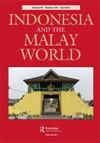Lumbung Nation
IF 0.9
3区 社会学
0 ASIAN STUDIES
引用次数: 3
Abstract
ABSTRACT Indonesian food security policy suffers from a fundamental internal contradiction – between neoliberal pressures towards more integration into the global market-based food system geared towards profit and an intractable residual belief in national self-sufficiency in staple foods. While this contradiction presents itself in technical and economic terms, it is fundamentally a matter of culture and ideology. The article addresses this contradiction by way of a study of key metaphors of food security, among which the most central is lumbung – the traditional rice barn. Lumbung of various kinds have been a central pillar of food security across the archipelago since ancient times and still serve in many contexts as a metaphor for food security at various levels. While this ‘lumbung culture’ may have ‘hindered’ attempts to integrate Indonesia more fully into wider circuits of market exchange, it has to some extent protected the Indonesian food system from the growing vulnerabilities of climate, resource/environmental stresses, and pandemics.邦邦民族
摘要:印度尼西亚的粮食安全政策存在根本的内部矛盾——新自由主义者要求更多地融入以盈利为目的的全球市场粮食体系的压力,以及对国家主食自给自足的顽固残余信念。虽然这种矛盾表现在技术和经济方面,但从根本上讲,这是一个文化和意识形态问题。本文通过对粮食安全的关键隐喻的研究来解决这一矛盾,其中最核心的是传统的粮仓“隆”。自古以来,各种木材一直是整个群岛粮食安全的中心支柱,在许多情况下仍然是各级粮食安全的象征。虽然这种“腰痛文化”可能“阻碍”了将印尼更充分地融入更广泛的市场交流回路的尝试,但它在一定程度上保护了印尼的粮食系统免受气候、资源/环境压力和流行病日益严重的脆弱性的影响。
本文章由计算机程序翻译,如有差异,请以英文原文为准。
求助全文
约1分钟内获得全文
求助全文
来源期刊

Indonesia and the Malay World
ASIAN STUDIES-
CiteScore
2.00
自引率
0.00%
发文量
17
期刊介绍:
Indonesia and the Malay World is a peer-reviewed journal that is committed to the publication of scholarship in the arts and humanities on maritime Southeast Asia. It particularly focuses on the study of the languages, literatures, art, archaeology, history, religion, anthropology, performing arts, cinema and tourism of the region. In addition to welcoming individual articles, it also publishes special issues focusing on a particular theme or region. The journal is published three times a year, in March, July, and November.
 求助内容:
求助内容: 应助结果提醒方式:
应助结果提醒方式:


